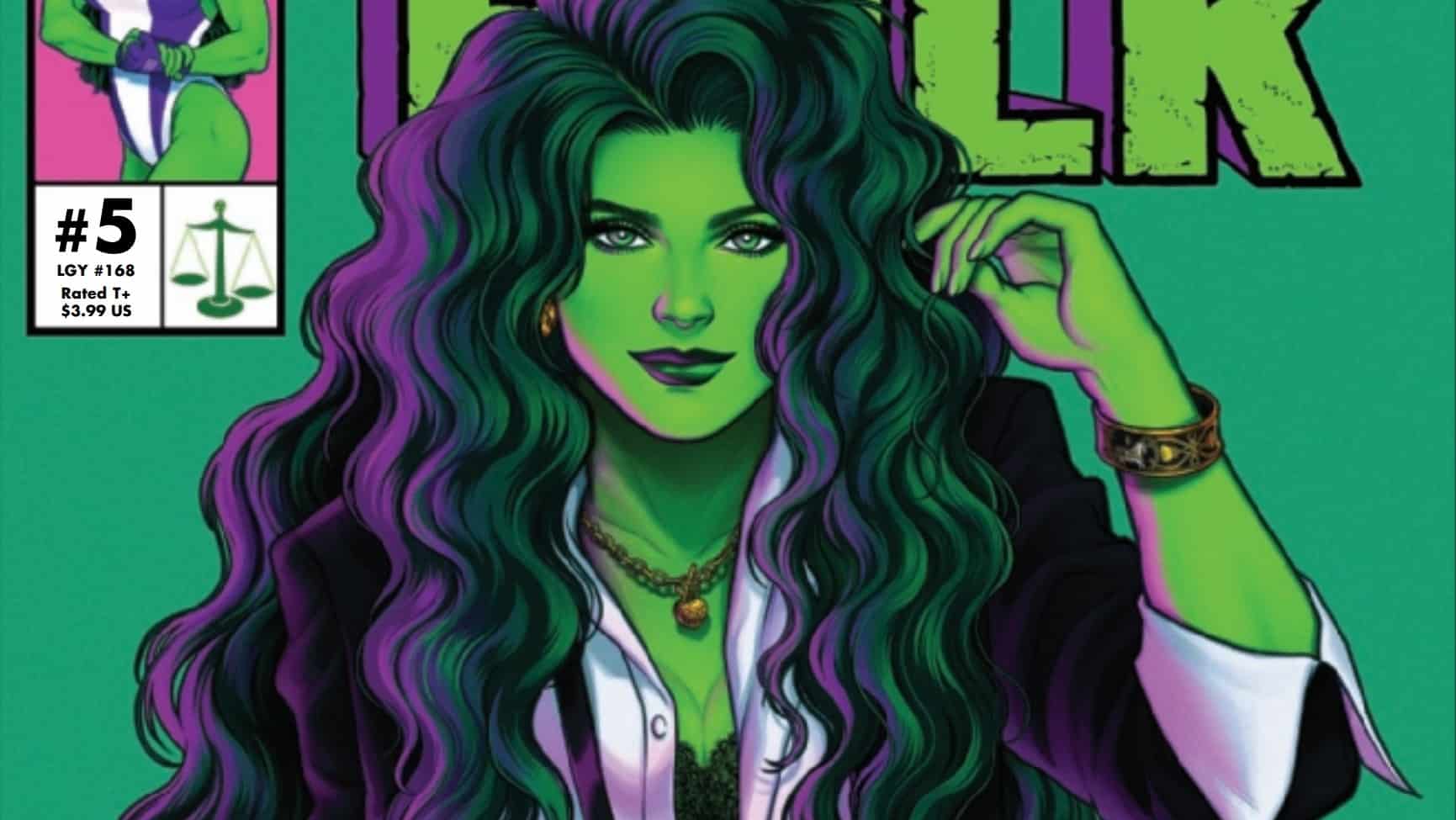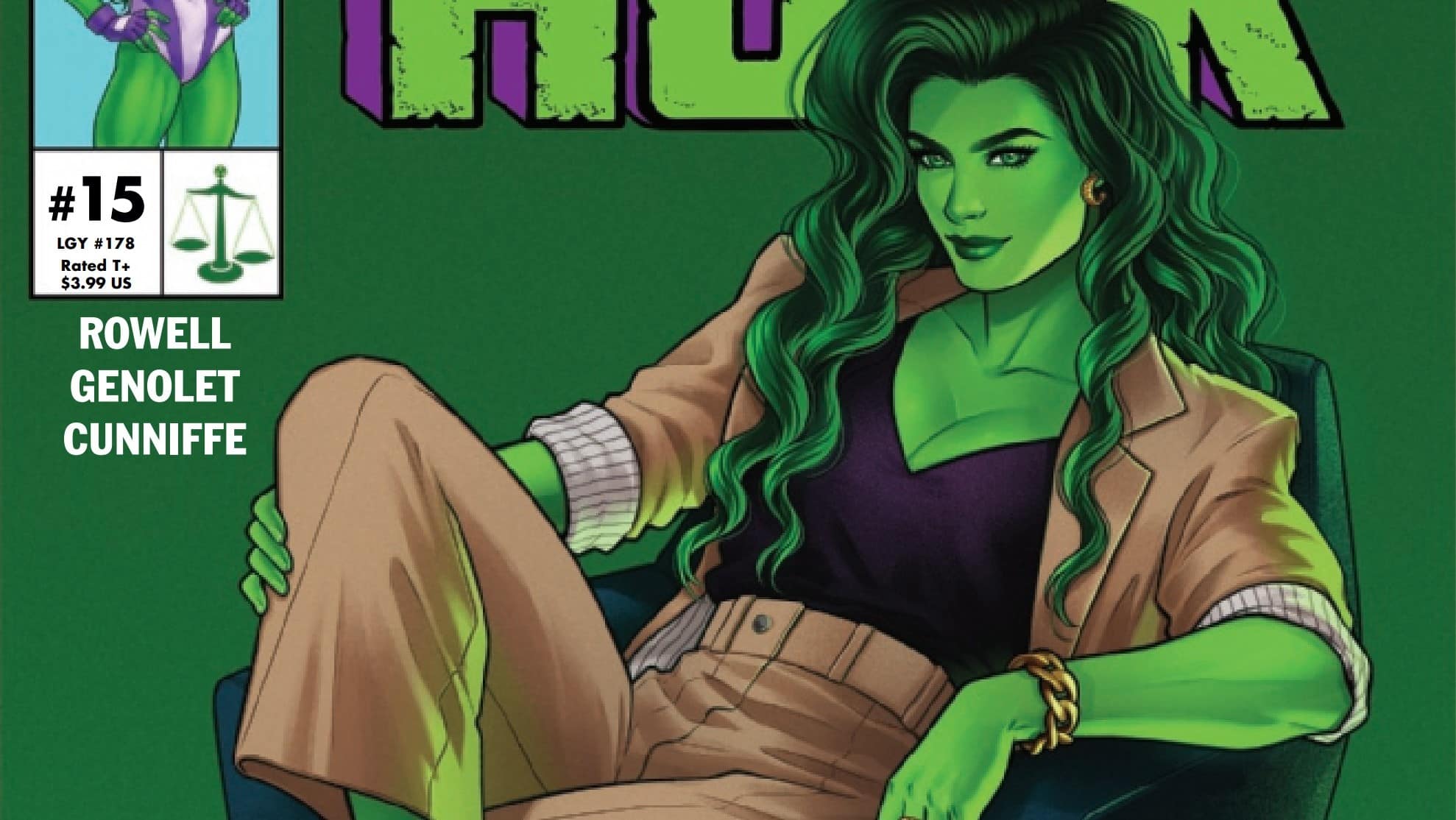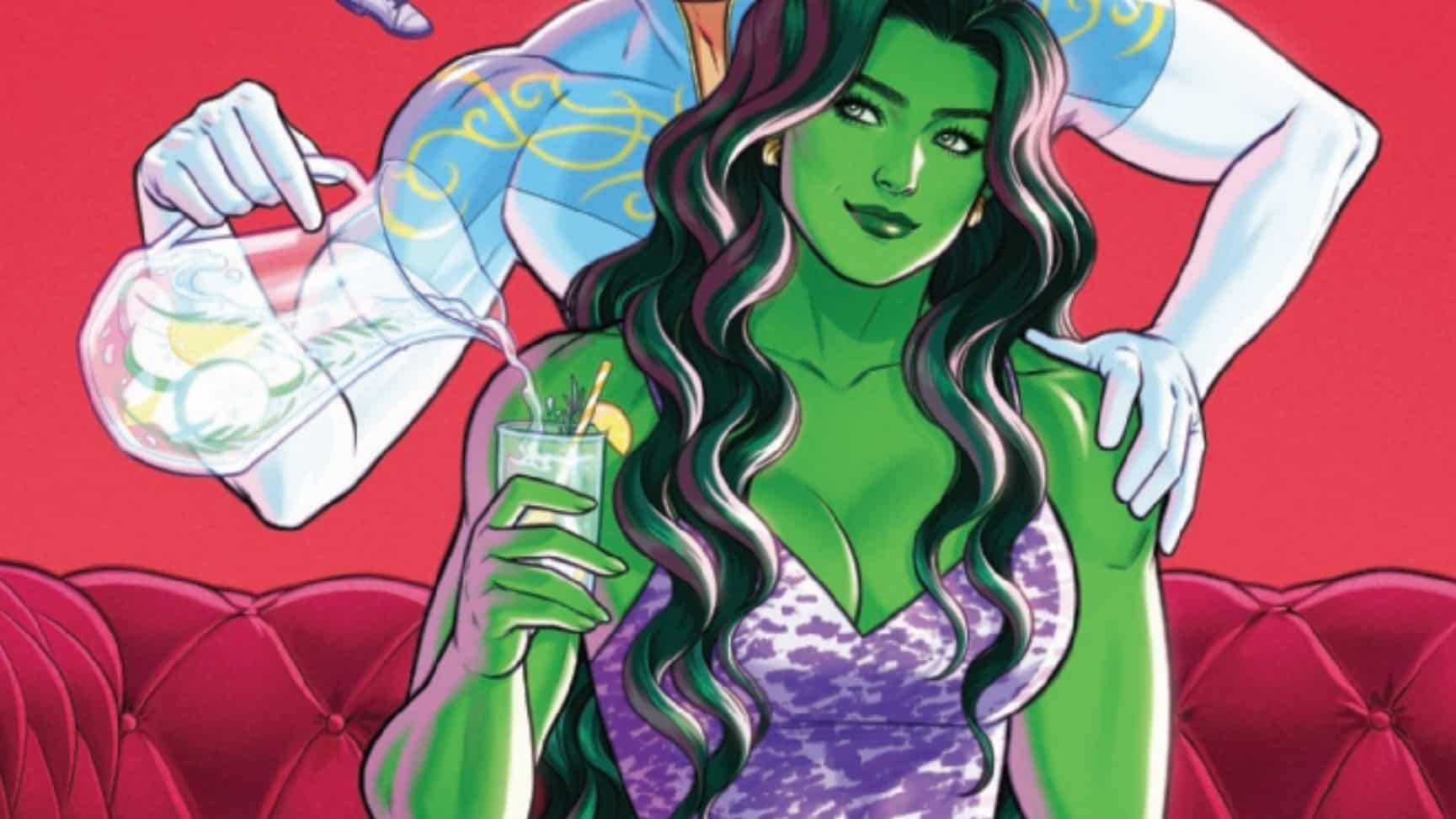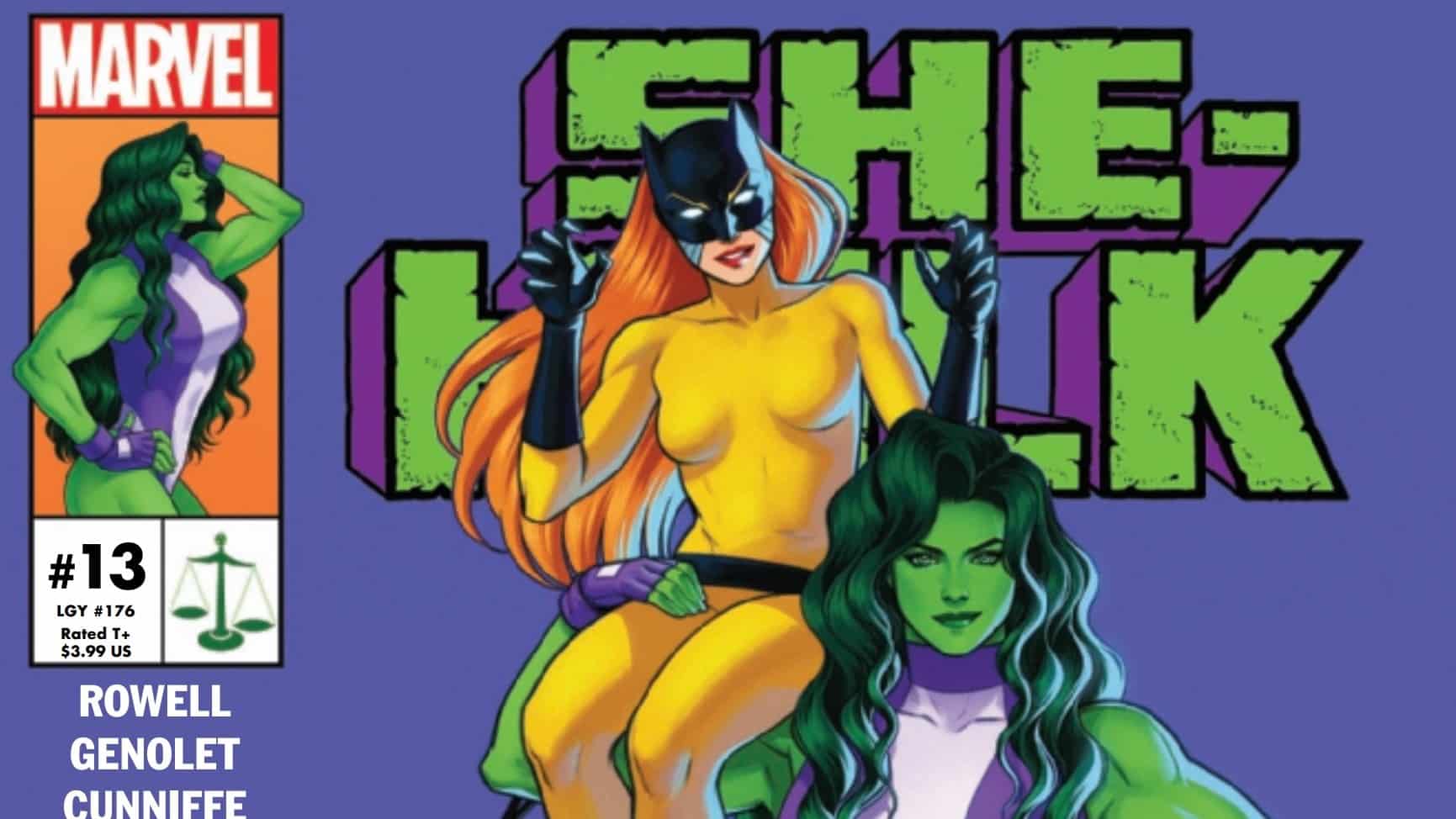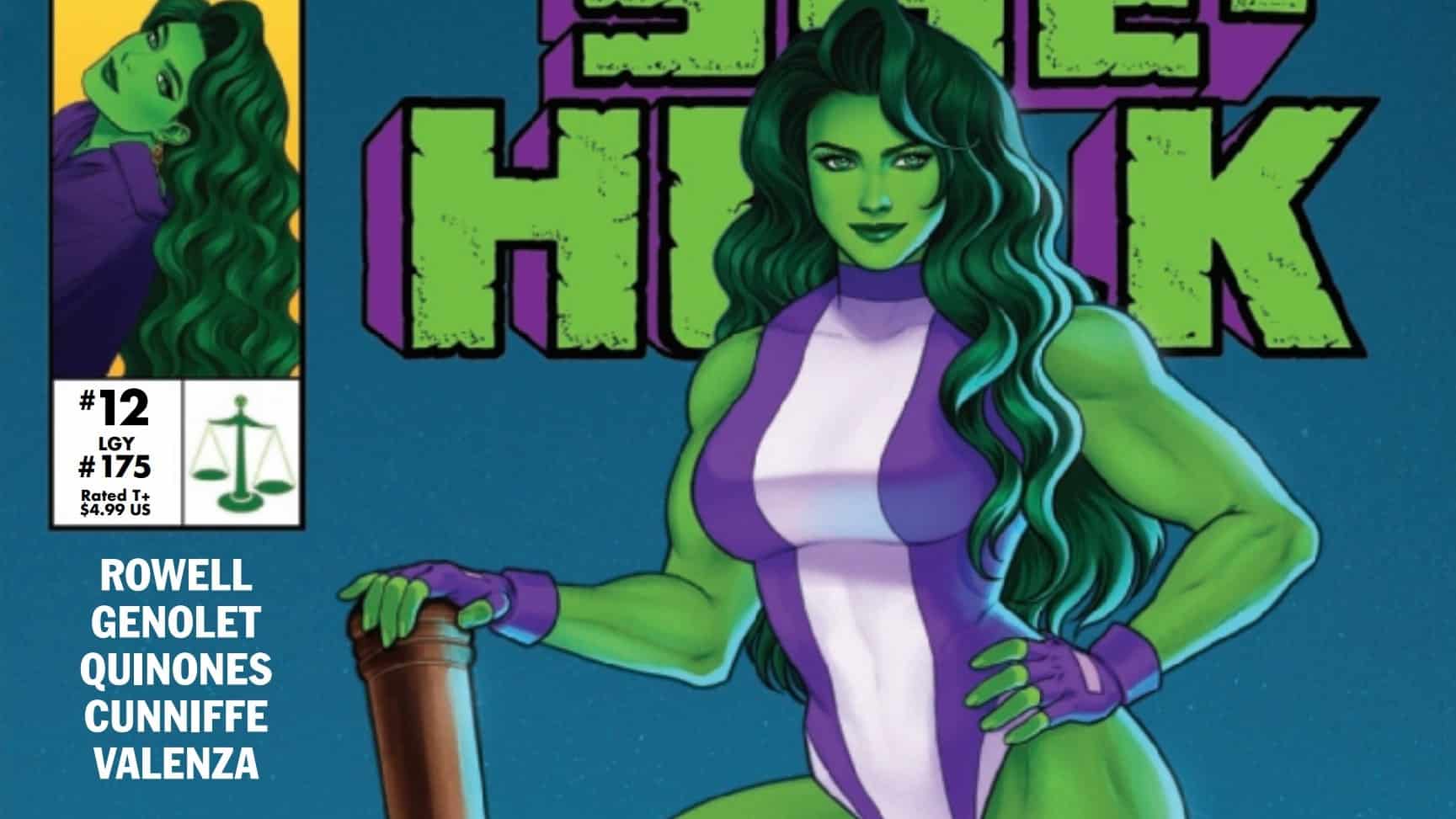There are certain problems — and opportunities — in coming back to life. Do you tell people you’re back, or take the chance to start anew? Jack and Jen discuss the possibilities over lunch … but first, there’s a man who’s rather upset that Jack looks like a playing card. No, we don’t get it either, but you’re welcome to try in She-Hulk #5, written by Rainbow Rowell, drawn by Luca Maresca, colored by Rico Renzi and lettered by Joe Caramagna.
Armaan Babu: I’m not gonna lie, Stephanie, this issue confused me. I feel like I’m missing something here. I always look forward to writing about She-Hulk with you, but this time more than usual. I’m hoping talking it over will help us figure some stuff out — or, at least, make me feel better about not understanding.
Stephanie Burt: Rowell began as a novelist. This comic book would make a lot of sense as chapter seven in a 12-chapter novel. As a stand-alone physical or digital object in an episodic series … uh … um. Definitely mysterious. A head-scratcher. A Mohawked, intellectually disabled head-scratcher. But I’m getting … ahead of myself.
Smashing Time

Armaan: We open with a fight scene that takes up about half the comic, and this is my first confusion. It’s a fun fight, don’t get me wrong — Luca Maresca draws a very lively, fun action scene. We have pretty low stakes here; She-Hulk and Jack of Hearts are up against a random superstrong man named Mark who’s mad at Jack of Hearts for having stolen the tarts (if you believe the nursery rhyme). With the low stakes, we get to have a little fun with the action. It’s playful, but with the stakes so low, it’s a little baffling why this gets so much attention — especially since it just … ends, unceremoniously, as Mark’s wife, April, walks in to calm everyone down.
Stephanie: It’s quite an ending, and I rather liked it: Mark acts like a supervillain someone has decided to sic on our Jen, and he behaves like someone who’s been mind-controlled, or hypnotized. He repeats nursery rhymes about people named Jack, beginning with the Jack of Hearts. That’s almost all his dialogue, throughout the issue, rendered largely in all caps (see what I did there?). I’m expecting Jack Be Nimble, or Jack and the Beanstalk, next. He turns out to be — so it seems — intellectually disabled. April appears, initially, as his caregiver: She shows up to calm him down, explain away his behavior and escort him off the premises.
Jen wants to hold him responsible for his actions, but April thinks he can’t be, because (she implies) he’s too childlike for that. It’s all a bit “Of Mice and Men” for me, to be honest, though I defer to anyone who has firsthand experience as a caregiver for a very strong, intellectually or emotionally disabled adult: Rowell is trying to give us a sympathetic baddie along with a mystery, and Jack takes Rowell’s side as they try for lunch at a partially wrecked cafe: “They didn’t seem like villains to me. They just seem like … human beings in a difficult situation.”
I’m with you, Jack. But I also suspect … a twist. As in: Mark really is being mind-controlled.
Armaan: I’m sure that Mark and April’s significance will be revealed somewhere down the line … but I’m not hooked.
I did like the aftermath of this fight, though. Maresca has a great sense of She-Hulk’s emotiveness. She just seems to be tired at the end of it. Not from the physical exertion, but from having to fight over a misunderstanding. Of the destruction that resulted. And in knowing that it’s up to her to clean it up. This is the second time we’ve seen her stick around for a quiet, wordless, post-fight cleanup, and I’m really enjoying it. Jen feels torn between wanting to be more responsible, more … contained, while her superheroic life just keeps intruding.
Stephanie: I think that’s right. Being Shulk is supposed to be fun. But Jen’s not having fun. Not in the courtroom, not in the street, not even with Jack, where moments that look romantic keep sliding into caregiving: the man needs a lot of help, with or without his powers.
How much do you want to bet that April and Mark are (ahem) not what they seem? It’s a better story — and a more respectful story — if they are. I imagine that April married Mark before he became intellectually disabled, and that something — or someone — turned him into the big guy who only speaks in nursery rhymes. I still need someone to blame for his faux-hawk haircut though. That’s inexcusable.
A Sense of Belonging

Armaan: After the brawl, Jack and Jen (I’m willing to wager that someone turns that name pairing into a nursery rhyme in a future issue) head to a restaurant for lunch, and to continue discussing Jack’s unique situation.
I love the lighting of this restaurant. Everything’s this well-lit but soft purple and gold, it’s a fantastic visual combination. It appears to be one of the fancier restaurants, too. It’s got all the fancy cutlery options of varying sizes — that’s about the only way I know to identify classiness. We’ve had two issues in a row of Jack and Jen eating in lovely places with great ambience. I’m liking it.
Stephanie: Jen belongs in a romance comic. Now she’s in one. Good for her. Rowell’s storytelling isn’t really Claremontian, but she does resemble Papa in her desire to make a superhero comic into something else, something slower, more character-focused. And she knows how to write romance.
Armaan: Something this comic sells really well is mood. The calm of the restaurant blends with the cozy lighting blends with the body language of Jennifer — she says she’s fine, but it’s clear that the fight’s bothered her. She’s subdued and hulked down … but a little light teasing from Jack brings her mood right back up.
Stephanie: The colors, outlines and panel design bring my mood back up, too. Marseca’s panel design, and angles, and body language are … chef’s kiss. That dinner date (Is it a date?) turns into a master class about varying panel shape, size, angle, even speech balloon placement to make talking heads look great.
Armaan: The other thing I really enjoy here — and something that a She-Hulk comic is often uniquely situated to explore — is mundane minutiae that comes up in the non-punchy aspects of superhero lives. Jack hasn’t told anyone but Jennifer that he’s back yet (Clearly, this takes place before the Fantastic Four’s “Reckoning War”), and Jack’s considering keeping things that way. Keeping his head down. Starting all over again.
Stephanie: Understandably so. One big difference between this comic and Rowell’s run on Runaways: L.A.’s premier team of supervillain-descended teen heroes could have adventures at some distance from the rest of the Marvel Universe, except when Wolverine (Logan) decides to visit.
Jen and Jack, however, grew up in the thick of it: They can’t have a conversation without referring to Avengers and Fantastic Four continuity. Jack has a great deal of history to escape, much of which I don’t know. I wish Marvel would go back to the 1970s-1980s practice of telling us what issue contains what backstory, with an asterisk and a word box. We could just hop on Marvel Unlimited and look it all up.
Armaan: Oh, I looked it up. Trust me, it is not worth the reread. Marvel is doing us a favor here by not making us look some things up.
Stephanie: Jack, however, can’t. “Eventually she’ll have to tell him what happened outside Avengers Mansion,” our Angry Claremontian Narrator tells She-Hulk, in a series of boxes (with their own font!) that work well despite their lack of footnotes. Jen wants to make things work. Jack responds with, honestly, low-grade chronic depression: He’s resigned to the end of everything — his life, his significance, the sun and the other stars. And he owns a “ghost mansion.” He can hide out there. Poor little rich boy.
Sometimes I Think You Know Me Better Than I Know Myself

Armaan: Jack makes the idea of starting over again a possibility to look forward to — which feels like the kind of thing that is the crux of the building Jen-Jack romance, considering this series opened with Jen’s general exhaustion at having to start over again. Both our heroes are, in some ways, in a similar place in life, but where for Jennifer it’s another spoke on an endlessly spinning wheel, for Jack it’s the new lease on life he’s been waiting for for years. He’s getting to experience the world anew. He’s excited about Brussels sprouts. And he looks cute in Jen’s sweaters.
What more could a romance ask for?
Stephanie: Pacing. A romance can ask for better pacing. After the fight against Mark and the long and melancholy dinner date, the comic just … forgets how many pages it can spend on slice-of-life moments, and spends them all on more slice-of-life moments that resolve nothing? I love those slice-of-life moments, but I felt like someone tore out a page by accident.
Armaan: After dinner, Jack and Jen continue their walk, and there’s a minor gag about radioactivity after Jennifer slips. This is followed by an abrupt last page showing Jennifer keeping an eye on Mark and his wife, April.
Stephanie: I think that’s more than a gag. It’s Jennifer joking about how hot she is, which, OK. But it also sets us up for something serious: Jack’s return, his power failure (he no longer has superpowers and doesn’t know why), Jen’s high (even for her) radiation level, and Mysteriously Aggressive Mark appear to belong to the same puzzle box. At some point we’ll put the puzzle together. But not here and not now.
Armaan: So that brings me to my second confusion, and that’s about the pacing of this series. It feels weird. I’m no stranger to decompressed storytelling, but this isn’t that, exactly. It’s just a quiet meander, one that I’d feel absolutely at home in if it was a book, or a visual novel, but it doesn’t quite work for a comic. Besides the extremely slow-burn Jack of Hearts romance, I don’t know if I could tell someone who wasn’t reading She-Hulk what the comic’s about — or at least, I don’t know how I’d describe it.
Stephanie: Exactly. It’s about five issues long at this point, the length of a modern miniseries, and we’re still at the setup stage: Jack’s back and powerless, Jen is newly employed and radioactive, and a still mysterious big bad has set bad things in motion and we’ve barely seen them yet. Also at some point before issue #20 Jack and Jen will presumably try to kiss.
Armaan: It’s not that I’m enjoying it, but the odd pacing means that we’re going to get issues like this, that feel a little … unsatisfying on their own. I recall having similar problems in Runaways. Rowell’s comics seem much better suited for reading as a trade. Do you feel similar?
Stephanie: I do, although — again — Runaways made it work, because the Runaways lived in their own corner of the Marvel Universe. Jack and Jen live in New York, right near Avengers Mansion. Instead they’re just walking past Grand Central Station at night (which looks beautiful, by the way, both in real life and in Maresca and Renzi’s rendering). I am a patient girl. I am willing to wait to find out what’s happening in this comic and who’s to blame and whether Mark and April are catspaws or just unfortunates. On the other hand, I already trust Rowell’s writing (from Runaways, and from her first Simon Snow novel) and I get watermarked review copies for free. If I were just buying floppies at my local comic shop because I liked She-Hulk, I’m not sure I’d stick with it much longer. What would Jennifer Walters do?
Last Minute Legal Notes
- Still don’t get why Mark is so mad. According to the nursery rhyme, the Jack of Hearts eventually bought all the tarts back!
- She-Hulk glaring at a caption is the closest this comic has come to breaking the Fourth Wall, and this subtler touch just makes it funnier.
- A heart over one’s eye does a lot for cheery expressions. I might want to cosplay Casual Dining Jack. [You’d have to watch a lot of makeup tutorials. Which Jack says he’s been doing!]
- No lawyer business at all in this issue? Really?
- Jack appears to have his own font. It’s something that’s hard to notice until the dinner scene, but now I can’t unsee it.
- Nightcrawler next issue? Really really really?

